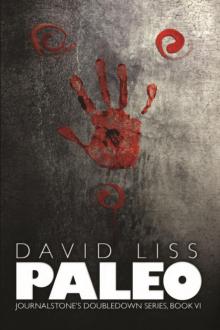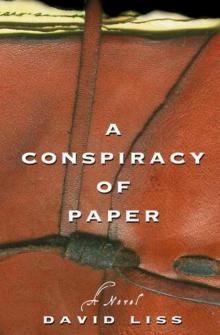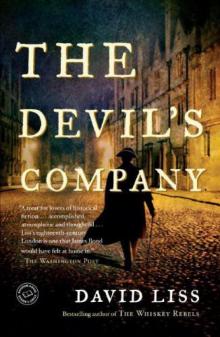- Home
- David Liss
The Devil's Company bw-3 Page 20
The Devil's Company bw-3 Read online
Page 20
“I can assure you, I am without prejudice.”
“And how many of my species of Hebrew do you count among your friends?”
I found this line of questioning most unpleasant, so I suggested she continue with her tale.
“Owing in part to the bigotry of the English race, and in part to the bigotry of your own people, he found it excessively difficult to ply his trade here, but after many years of effort, he managed to earn a comfortable living. Sadly, when I was of only seventeen years, he died in an accident involving his labors. I am told that such accidents among men who work with stone are all too common. My mother had no means to support us, and we had no remaining relatives in the country. We thus came to depend upon the charity of the synagogue, but that institution, unlike your own, is so poor it could little afford to buy us bread or keep a roof over our heads. This shame was far too much for my mother, who had never been of a strong constitution, and she followed my father to the grave within six months. In my grief, I found myself alone in the world.”
“I am very sorry to hear of your troubles.”
“You cannot know my misery. Everything I knew had gone, and I had nothing to which to aspire but penury and illness. In such a state, however, I chose to narrowly examine my father’s records and discovered that a man of some prominence yet owed him three pounds, so I traveled across the metropolis, making the journey on foot and enduring all manner of abuse you can imagine. I ventured out and suffered so, all in search of this debt, knowing the foolishness of the venture, for I had long since come to understand that such men will never pay when they can avoid doing so. I fully anticipated a rude refusal, but I met with something else entire. Despite the rags upon my back and disheveled appearance, the gentleman saw me himself and delivered silver into my hand at once with the most profound apologies and concern for my sorrows. Indeed, he paid double what he owed me out of consideration for my suffering. And he offered me more, Mr. Weaver. He suggested I might continue to associate with him in the form of his companion.”
I struggled to keep my face from betraying emotion. “You must not be ashamed of doing what you must to survive.”
“I have not spoken of shame,” she told me, meeting my eyes boldly. “I had six pounds in my hand. I was in no danger of starving for months, perhaps. And yet I accepted his offer, for why, I thought, should I not have clean clothes, a place to live, and food enough to exist beyond the lofty state of eluding death? I know something of your story, sir, for it has been written of in the papers. In your youth, when you were penniless, you took to the ring. You lived, therefore, upon the merits of your body. I did the same, yet when women do so, they are called all manner of unsavory names. If a man takes it upon himself to care for a woman-attends to her needs, her clothes, her food, her housing, and in return she is obligated only to accept the attentions of no other men—in some lands they would style that arrangement marriage. Here it is called whoring.”
“Madam, I assure you, I offer no judgments.” “You offer none with words, but I observe your eyes.” I could make no answer, for she had correctly observed my expression. I had lived upon the streets long enough to know the foolishness of judging a woman for using what advantages she has to keep from death—or from a state not much more desirable. I knew also that it was only because men wished to hold dominion over the behavior of women that we were so quick to give scurrilous names to their taking liberties with their own bodies. And yet I felt a disappointment, for I suppose I wanted her to be pure and innocent, and I knew this desire on my part was foolishness. It was, after all, her sense of freedom, her wit, her sense of being at ease in the world—nay, of being the mistress of the world—that so drew me to Celia Glade.
“Like you, I am but a product of the world in which I live,” I offered. “I have been trained since my earliest youth to form such judgments upon women who make the choices you have. And if, in my more mature years, I wish to reject those ideas, there nevertheless remains within my mind a contrary voice.”
“Yes,” she said. “I have made decisions, and I knew they were the best decisions available, but I hear the contrary voice too. As I would have you not condemn me, I must not condemn you. Now, to continue with my history. I lived in a very high style while I was his favorite, and he very much enjoyed my natural tendency toward mimicry. At first he would only encourage me to imitate associates, but then he began to purchase disguises and have me assume all sorts of shapes; a gypsy mendicant, an Arabian courtesan, a peasant girl, even an old woman. For this gentleman’s pleasure, I learned the skills you have observed. Then, as so often happens in these circumstances, he met another woman who was younger and newer and therefore more suited to his fancy.”
“He must be the greatest fool in the world to have preferred another woman to you.”
I saw a distant pleasure gleam in her eye, but she chose to ignore my flirtation. “Even though I was no longer his favorite, this gentleman, whom I shall not name, believed he understood his duty—unlike Mr. Ellershaw, as you describe it—and continued to assist me in my needs. And then, after some two years of this kind neglect, he contacted me and told me he wished me to apply my skills in his service. As he had been so kind to me in the past, I could hardly say no, particularly since to do so would be to sacrifice my future comfort. And so I have come to Craven House as his eyes and ears, to discover what I can about the Company’s illicit practices, that the Eastern trade might be more open to all men of business. The night I met you, I thought you were one of my patron’s servants come to collect some papers I had copied for his purposes, and that was why I inadvertently revealed myself.”
I thought to say that I was not alone in telling fabulous tales fit for a novel, but I understood that to do so would be unkind. I merely nodded sympathetically. And then, when a hint of a tear appeared in her eye, I reached out to pat her hand. In so doing, I knocked over her tumbler of gin. It had sat neglected since arriving upon our table, and far from the fire as we were, I had every reason to believe it would grow enormous cold, in the way of such liquors. I could only imagine the startling sensation as it poured onto her lap.
“Oh, it’s cold!” she cried out in her natural voice—not that of an aging whore at all—as she jumped back and began to wipe at the spilled drink. Fortunately, she was not too soaked, and though the other patrons of the tavern enjoyed the spectacle, no one seemed to notice that she cried out like a young lady, not like a used and withered baggage.
“I do beg your pardon,” I said. I dashed at once to the counter, where I convinced the barman to lend me a relatively dry towel. I allowed Miss Glade to return to her seat thereafter.
“I am truly sorry for my clumsiness,” I said, once I had returned the towel. “I must have been so dazzled by your beauty that I forgot to keep my wits about me.”
“Your charming words would be more compelling were I not dressed this way,” she said with a wry smile, but I knew I was forgiven. Indeed, the accident helped to leaven the tension between us.
I had much to think about, and I knew not how much of this discovery I should share with Mr. Cobb. It had been obvious to me that Miss Glade’s story had been a lie—at least that part of attempting to aid a wronged merchant. Her narrative was too much like my own, a tale of minor justice pursued at no great cost. No one could object to or condemn her cause—no one but a Company man, of course—and whatever she suspected of me, she knew I was not that.
What of Miss Glade, though? If she was not what she said, what was she? I had my suspicions, for I had not believed her story of dressing up for her lover. I presumed she had not been upon the stage, for she would have said as much if it had been true. Then who would have the skills to so disguise herself?
It was in pursuit of such answers that I had spilled the drink upon her. The room was cold, and I knew the drink would be close to freezing, so I hoped she would cry out, and that her cry would be true and undisguised. It had been but three words, three syllables, but it had been enou
gh for me to hear the trace of accent in those words. The o long and extended, the h clipped, hardly there at all, a period more than a sound, the i sounding more like an e than is common among the British. It was neither the accent of a lady born on these shores nor the speech of one born to Tudesco Jews. Oh, yes, I knew that accent, even from so few words.
Miss Glade was a Frenchwoman pretending to be otherwise, and I could think of no reason why she should do such a thing if she were not a spy in the service of the French Crown, in service to the very men, I must presume, who had staked their wagers upon my death.
CHAPTER SIXTEEN
HY WOULD THE FRENCH CONCERN THEMSELVES WITH MY ACTIONS at East India House? I was in no way equal to the task of pondering that question, and accordingly I chose to take my leave of the lady as soon as I possibly could, that I might contemplate this development in private. I forced myself to wait long enough, however, that she would in no way understand that her outburst had revealed anything of herself.
I accompanied her—or, I should say, she accompanied me, for she knew the warrens of St. Giles far better than I—to High Holborn, where I intended to procure a hackney for her. As we walked she began to remove pieces of her costume to a small sack she carried: her wig, her tattered gloves, replaced by fresh, a cloth that effectively wiped away all her paint. She still wore clothes hardly suited to accentuate her charms, and her teeth remained stained with paint, but by the time we emerged upon the busy street, she looked not like a crone but like a beautiful woman dressed rather shabbily.
“In what manner do you prefer me?” she asked.
“Allow me to ponder the question,” I answered, “and I shall send you my response anon.” I caught the eye of a coachman, who beckoned us forward.
“I shall ignore your teasing and accept your kind assistance with the hackney. But what of yourself?” she asked.
“I must first make sure you are safely away, and then I shall find my own conveyance.”
“Perhaps we can share,” she said, not a little vivaciously.
“I do not know that we travel in the same direction.”
She leaned close to me now. “Surely we might arrange that the same direction is precisely where we go.”
I do not know that ever in my life have I worked harder to master my passions. She looked up at me, her face slightly lowered, her dark eyes wide, her red lips slightly parted so I could observe the enticing pink of her tongue. It would have been easy, so easy, to follow her wherever she wished to lead, to allow her to take me in her arms. I could have told myself that I did it for the cause—by being close to her, I would learn more of her designs. Yet I knew all that to be false. I knew that were I to succumb to her advances, to my desires, I should not be able to trust my instincts from that moment. If it had only been my life, my safety, in the balance, I should have happily thrown the dice and accepted the wager. But my dearest friend, a kindly aging gentleman, and my infirm uncle depended on me to maintain my wits and my judgment. I could not stroll blithely to what might well be the most pleasant of gallows with the lives of so many others dependent upon my success.
“I fear I have an urgent appointment I must keep,” I told her.
“Perhaps I could make an urgent appointment with you for another night,” she proposed.
“Perhaps so,” I managed, though my mouth grew dry. “Good night, madam.”
“Wait.” She very boldly took hold of my wrist with her hand. A jolt of excitement, hot as fire, passed through my flesh. I think she must have felt it too, for she let go at once. “I hope,” she said, quite apparently stammering for words, “I—well, I know I can be playful, but I hope you have some regard for me. You do, don’t you?”
“Of course, madam,” I managed.
“And yet you are so formal. Will you not be at your ease with me?”
“I should very much like to,” I said, “but I do not believe this is the time. Good night,” I told her once more, and tore myself away hastily, hurling myself into the distance.
I had told her the truth. I should like to be at my ease with her, and this was not the time. No falsehood in that. I merely neglected to mention that I did not believe relaxing my guard around her would be beneficial to my freedom—or even my life.
A NEARLY SLEEPLESS NIGHT of confusion made matters no clearer to me, so it was my good fortune that I had the opportunity to encounter Elias that very next morning. It was distressing enough that the French wished to labor upon my death, but to learn that Miss Glade, a lady to whom I was forming an attachment of no small measure, might well be one of their number left me both confused and morose.
I had some business that morning with one of the clerks of Craven House, and after the meeting I was delighted to see Elias in the building’s lobby, in close conversation with a woman. I momentarily wondered at his presence until I recollected he must be in the building on account of Ellershaw’s malady. I hurried forward, but my eagerness dissipated almost instantly, for I saw that the person with whom he spoke was none but Celia Glade.
Before I was close enough to hear a word that came from his mouth, I recognized his posture: his tall form held ramrod straight, his smile wide and dazzling, one hand pressed to his chest in a continual performance of gentlemanly poise. Elias sought his prey as surely and as single-mindedly as any predator.
I divined that he had just spoken something meant to amuse, for Miss Glade put a hand to her mouth to stifle a laugh—a noise considered most inappropriate inside Craven House. It struck me as most inappropriate that he should try to charm her or, more horrifically, that she should be charmed by him. I told myself I could not trust Elias to maintain his defenses against such formidable female graces, but I knew better than to believe my own explanation.
Accordingly, I rushed forward, fully intending to break up this most unpropitious meeting. What, I wondered, did Miss Glade know? Was she aware of my friendship with Elias? Did she know that his fate was so closely bound to mine? The only thing of which I might be certain was that I wished she should learn nothing more than she knew already.
“Good morning, Celia,” I said to her, ignoring Elias for the moment. “Do you think it wise to advertise to all of the Company that you have need to speak with a surgeon?”
In retrospect, I realized I might have chosen a less venomous method to end their discourse, one less suggestive of what I had learned of her—now likely false—history. At the time, I was pleased enough that it did the business. Miss Glade turned red and hurried off.
Elias narrowed his eyes and pressed his lips together, a sure sign of his irritation. “I say, Weaver, that was most unkind.”
Given that I had much to discuss with him and could not do so here, I hardly hesitated before violating the rules and quitting the premises for a journey to a nearby tavern. The entire way, he complained about my ending his congress with Miss Glade.
“That girl was a delectable nugget, Weaver. I’ll not forget this outrage soon, I tell you.”
“We shall discuss it later,” I grumbled.
“But I wish to discuss it now,” he insisted. “I am far too irritated to discuss aught else.”
I ducked my head to avoid one of the metropolis’s many and notorious low-hanging shop signs we came hard upon. Elias was too distracted to see it, and indeed I was so angry I nearly let him strike himself, but in the end I could not see him take an injury, even a minor and comical one, so I reached up and pulled him down as he walked. He kept his balance and did not miss a stride.
“Oh,” he said. “That was a good turn. But it does not excuse this outrage, Weaver. Outrage, I say. I shall order something very dear and insist you pay for it.”
Once we were equipped with our pots and Elias had called for a plate of bread and cold meat, and then fortified himself with a pinch of snuff, he began once more.
“In the future, Weaver, when you see me with a pretty girl, I should very much like—”
“Your life and mine and the lives of my friends
depend on what happens in Craven House,” I said, not a little harshly. “As far as concerns you, I am the lawgiver there. You do what I say and when I say, and you do not grumble about it. I’ll not let your insatiable appetites and inability to sense danger when it is under your nose lead the two of us and others into ruin. You may think being unable to govern your appetite for women is nothing but amusing, but in this case it may well prove to be nothing short of self-destruction.”
He gazed into his pot, taking the time he needed to master his passions. “Yes,” he said at last. “You are right. It is not the appropriate place to seek out pleasures, and you are right that I am not terribly good at making wise decisions when it comes to women, particularly the pretty ones.”
“Good.” I clapped my hand upon his shoulder, that he might understand it best to let the thing pass. “I’m sorry I grew so hot with you. I have been tried most sorely of late.”
“No, you need not apologize. I require a good thrashing now and again, and better it be done by my friends than my enemies.”
“I shall make an effort to recollect your words,” I said with a grin, feeling much relieved that the discomfiture had passed. “Now, tell me about your more appropriate adventures.”
I cannot say if it was with effort or if his mercurial nature allowed him to drop his resentment so readily, but he brightened at once. “Your friend Mr. Ellershaw is terribly afflicted.” The news sounded grave, but he delivered it with a grin.
“The French pox?”
He shook his head. “Not the French pox but the English malady. Madness.”
“What do you mean?”
“What I mean, Weaver, is that he believes he has an advanced and virulent case of syphilis—though at times he speaks of it as gonorrhea, not comprehending the difference—and yet he has not a single symptom. I can find no sores, pustules, rashes, or inflammations, nor can I find signs that there have ever been such.”

 The Whiskey Rebels
The Whiskey Rebels Renegades
Renegades The Twelfth Enchantment: A Novel
The Twelfth Enchantment: A Novel The Day of Atonement
The Day of Atonement The Devil's Company
The Devil's Company Randoms
Randoms Paleo / The Doomsday Prepper
Paleo / The Doomsday Prepper Rebels
Rebels A Spectacle of Corruption
A Spectacle of Corruption The Twelfth Enchantment
The Twelfth Enchantment The Coffee Trader
The Coffee Trader The Ethical Assassin
The Ethical Assassin The Devil’s Company: A Novel
The Devil’s Company: A Novel The Double Dealer
The Double Dealer The Whiskey Rebel
The Whiskey Rebel A Conspiracy of Paper bw-1
A Conspiracy of Paper bw-1 The Devil's Company bw-3
The Devil's Company bw-3 Marvel's SPIDER-MAN
Marvel's SPIDER-MAN